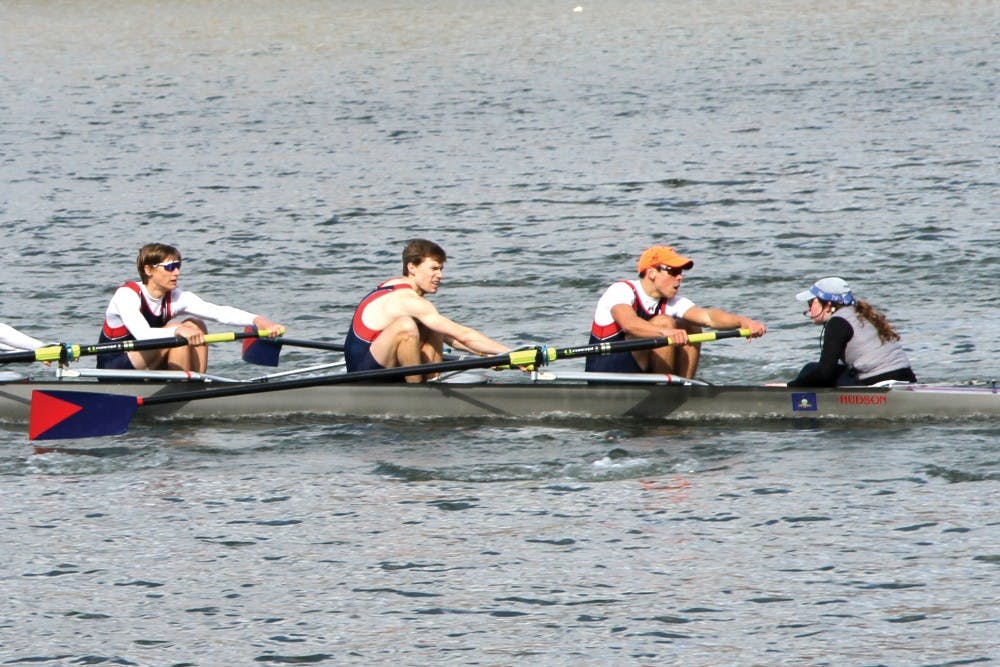While Penn men’s athletics may still be far away from reaching title nine in 2015-16 (eight titles away, for those counting), women are still making an impact on the men’s athletic program across the board.
With female coaches, trainers and even athletes contributing to men’s teams, the Red and Blue are helping eliminate the narrative that women can’t play with the guys.
Penn football doesn’t feature any Sam Gordon-esque athletes shocking the world, but a pair of women still helped the Quakers prepare for their stunning 2015 season. Athletic trainer Jessica Stilwell worked to help banged-up athletes stay on the field, while strength and conditioning coach Tracy Zimmer got the squad in peak condition for its four-win improvement in Ivy League play.
“From the time I was an undergrad, I had an opportunity to work with two Division I football teams [Lafayette and Lehigh], and I really grew a love for football,” Stilwell said. “When I came to Penn, the football position was open, so here I am.”
With a balance of strict instruction and casual interactions, the training staff has thrived as a line of communication between players and coaches.
“It’s important to set the precedents, but as the season goes on, you get to know your athletes on a personal level as well. There are certain days when you’re joking around and certain days when you have to be more strict,” Stilwell said. “We really have no issues with the athletes. They’re a great group of guys, and they respect the coaches and athletic trainers equally.”
While football may not feature any females suiting up for battle, both Penn’s heavyweight and lightweight men’s rowing programs have women on the roster, serving as coxswains for boats.
“I steer, I talk a lot in the boat, like running drills or warm-up pieces, keeping track of where we are during a long race so that I can communicate to the guys,” said sophomore Natalie Burke, the eldest of the three female coxswains on the lightweight team. “It’s not crazily strict, but I have a job to do.”
Burke initially began serving as a coxswain after being recommended by a high school classmate on a local club team. She had interest in collegiate programs of both genders before ultimately choosing to join Penn’s lightweights, immediately taking on a crucial role for a squad that finished sixth in the Intercollegiate Rowing Association National Championships in 2015.
“I could’ve gone either way,” she commented. “I wanted to find a team where I really liked the coaching staff and the team would get significantly better over my years there, and then I also really wanted to find a school that I was going to love, so it just worked out well for me.”
Although Burke and her fellow coxswains don’t undergo the same training regimen as their scull companions with oars in hand, they still feel as much of a part of the team — inside and outside of the boat — as anyone.
“We’re integrated into the team, we’re not a separate part at all,” Burke said. “I don’t think that gender makes that much of a difference, as long as we’re doing our job.”
Meanwhile, as Burke serves as a de facto coach for the rowers while she gives steering commands, two Penn men’s teams actually have females serving as assistant coaches - track and field and swimming.
“Our vibe depends on the practice, on the required intensity of that day,” said Porscha Dobson, the sprints and hurdles coach for the men’s and women’s track programs. “I wouldn’t say I’m super laid back, but I wouldn’t say I’m super strict either. I try to find the happy medium.”
Most of Penn’s track and field coaches had impressive careers before joining the staff, and Dobson was no exception, being named New Jersey’s Athlete of the Year as a high school hurdler in 2004 before earning first team All-ACC honors at North Carolina.
“In our sport, where the work you put in dictates your outcome. ... I definitely think [my career] plays a role as far as gaining respect from the athletes,” she said. “I joke around sometimes that the times that they’re running now, I ran when I was 15. The only way I was able to do that was by putting all the work in, so them knowing my background definitely helps.”
While Dobson acknowledged slight differences in the approaches of male and female coaches, she made it known that production is appreciated regardless of who it’s coming from.
“There are things that you have to be a woman to know, and there are some things you have to be a male to know,” Dobson said.
“But at the end of the day, a good coach is a good coach.”









